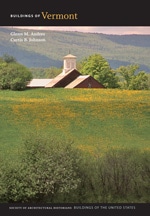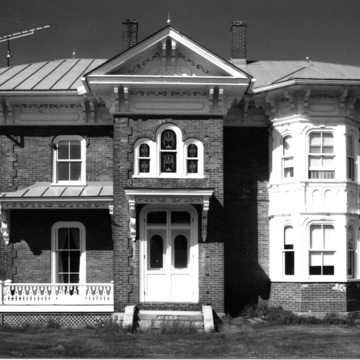Around the time of the Civil War, Charles Allen inherited the four-hundred-acre farm his father established along the lower Trout River near its confluence with the Missisquoi. According to local tradition, he built this two-story brick house added onto the old wood-frame farmhouse for his bride, Lydia. With a low jerkinhead roof it is detailed in the robust Italianate vocabulary popular in St. Albans and much of Franklin County. Not surprisingly for a farmhouse, it is a conservative central-hall dwelling. This is obscured somewhat with a projecting two-story, pedimented central entrance, a two-story bay window to the right, and to the left a small veranda covered by a wide hood on brackets. The profuse late Italianate detailing is of the highest quality throughout, including arched windows, scroll-sawn brackets, rounded panels between brackets along the eaves, incised valances on the entrance and porch hoods, and a triple-arched Palladian-motif window that opens to a tiny balcony over the entrance. Etched roses in the glass of the double front door, chamfered columns on a side porch, and a paneled arcade between the floors on the front two-story bay window complete the profusion of Italianate ornamentation. At the same time Allen expanded the farmhouse, he erected many wood-frame farm buildings including a carriage barn with an Italianate ventilator cupola, a gable-front horse barn next to it, and behind the house a large, gable-entrance, ground-stable bank barn for his thirty-five dairy cows.
You are here
Charles Allen Farmhouse
If SAH Archipedia has been useful to you, please consider supporting it.
SAH Archipedia tells the story of the United States through its buildings, landscapes, and cities. This freely available resource empowers the public with authoritative knowledge that deepens their understanding and appreciation of the built environment. But the Society of Architectural Historians, which created SAH Archipedia with University of Virginia Press, needs your support to maintain the high-caliber research, writing, photography, cartography, editing, design, and programming that make SAH Archipedia a trusted online resource available to all who value the history of place, heritage tourism, and learning.






